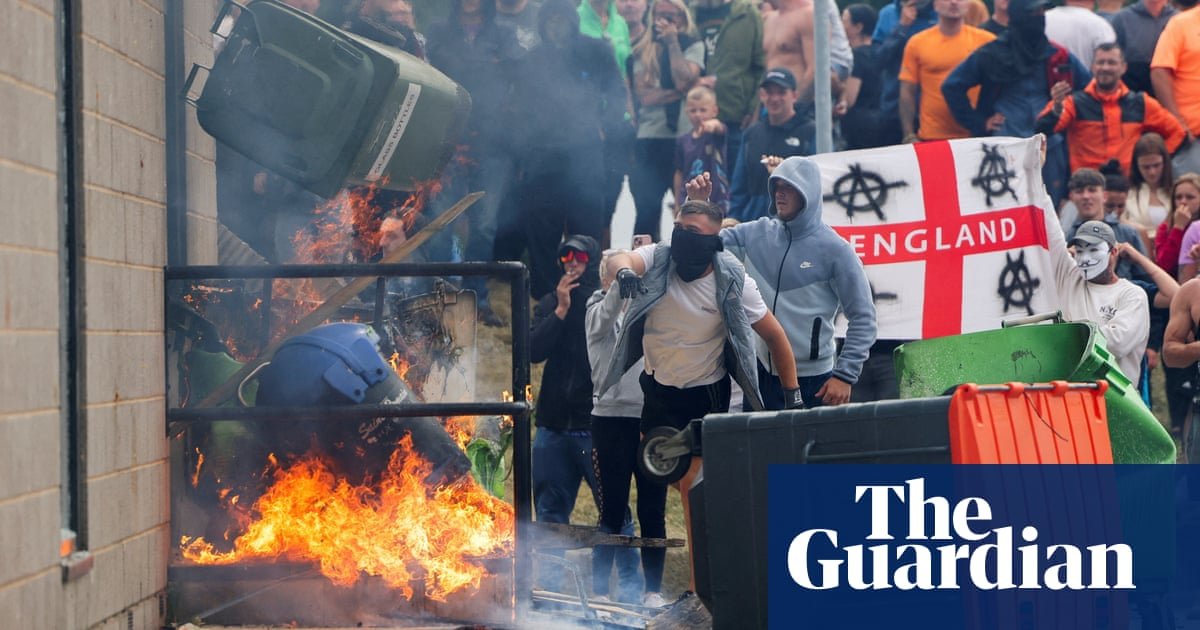Was it naive to think it would be a peaceful protest, people wondered after the riot at a hotel housing asylum seekers in Rotherham, where windows were smashed, police attacked and a fire escape briefly set ablaze with 250 people trapped inside.
The demonstration was to be held at noon on Sunday outside the Holiday Inn Express in Wath-upon-Dearne, known locally as Wath, a village north of Rotherham. The hotel is not a stranger to protests. It is contentious locally and had become the scene of anti-immigration outrage in the past – though there were few who anticipated what a terrifying turn Sunday would take.
But the signs that it would be a flashpoint for violence had been there all along. It is an area with deep, decades-long community tensions and a history of clashes over immigration. Over a weekend of escalating violence it flared again.
Among the substantial group of local residents who had come to tidy up on Monday morning, the mood was sombre. There was a huge sense of exasperation with their own community and those who stoked violence from farther afield.
Locals recalled only half an hour of peace before the first missile was thrown. Within two hours more than a dozen hotel windows were broken, rioters had entered the hotel and, in what police described as a “particularly sickening moment”, attempted to set the building on fire. It was, police said, “a concerted effort to cause … serious harm to those inside”.
One local resident, Susanne, said she had come for a peaceful protest on Sunday but was shocked at what began to unfold. “It was disgusting,” she said. “When I saw them attack the police, I was nearly crying.”
She added: “The adrenaline was pumped and they didn’t care what trouble they get into, they were gonna keep going.”
Some felt the asylum seekers – who were teenagers in some cases – had antagonised the baying rioters outside by appearing in the windows and making what they said were offensive gestures. They claimed they had seen the asylum seekers with weapons, though the Guardian understands these were most likely poles from the wardrobes and crutches that one man used to walk.
Anti-fascist protesters from the local Stand Up To Racism group and the Trades Union Congress were overwhelmed early on and kettled by the violent far-right mob. One Muslim man, Muj, who had been called over from Bradford to help his frightened friend who was stuck at the scene, said he was called a racial slur. Police took them a mile away to safety.
Dozens of officers were brought in from Sheffield, where an anticipated riot never unfolded, and assistance was provided by other local forces to tackle a crowd that had grown to 750 people, police later said.
They used riot shields to push violent and aggressive men back. Chants of “Tommy Robinson” and, to the disdain of other local people, “Yorkshire” could be heard from people who said they “want our country back”. Police succeeded in gaining significant ground throughout the evening, despite a constant barrage of bottles, bricks and pieces of wood, some of which were set on fire from a large bonfire that filled the sky with smoke.
A bus stop was smashed and occasionally members of the crowd were pulled through the police line to get treatment from the ambulance as they were hit by errant missiles.
Police horses backed up, startled, as fireworks careened in their direction. The officers were not as easily spooked in their fireproof riot gear, standing stoic with their shields as explosives popped at their feet, showering them with sparks. The perpetrators later on were exclusively young, with a local 16-year-old girl saying she knew most of them from school, though some had been in and out of prison.
The Guardian spoke to some of the hotel residents through a smashed second-storey window before being moved on by police. Most said they were OK and gave thumbs up but one man shouted down: “I am not OK.”
In quiet corners, exhausted police were looked after by colleagues. Some lay on grass verges catching their breath; others simply sat with their heads in their hands. At about 5pm, relieved officers received word their colleague who had been knocked unconscious was being treated in hospital. At least 12 officers were injured in total, according to South Yorkshire police.
Watching the events, which eventually finished at 5am, unfold with South Yorkshire police silver command was the mayor of South Yorkshire, Oliver Coppard.
“It genuinely made me angry and sad,” he said afterwards.
The asylum seekers in the hotel were eventually taken to safety in the early hours, he confirmed. “Physically they were OK, they were safe. Psychologically, though, these are people who come from some of the most violent, poorest parts of the world, and they have come here looking for safety. And then they’ve been attacked, in our community, and faced the same sort of violence as they’ve faced at home here in South Yorkshire. And I’m appalled by that.”
Appearing at the scene on Monday, the South Yorkshire police assistant chief constable Lindsey Butterfield said it had been “a dark day and we know this was felt across the county”.
Outside, handing out bottles of water to the helpers, media and police, were two local women who worked in the hotel, one of whom had been behind a barricaded door and powerless in the face of the unfolding violence. She looked fragile, lips trembling as she quietly explained she was not allowed to talk to the media about what had happened.
Was it terrifying? Tears ran down her face.
“That’s your story,” her colleague said sadly.
